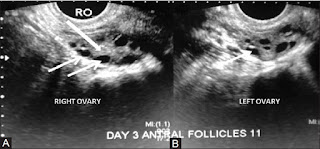Must Have Tests Before Planning a Pregnancy: By Dr. Ankita Kaushal
Introduction
Embarking on the journey of parenthood is an exciting and life-altering decision. To ensure a smooth and healthy pregnancy, it's crucial to lay a strong foundation by understanding your fertility potential. In this blog Dr. Ankita Kaushal, we'll explore the baseline tests that can provide valuable insights into your reproductive health and increase your chances of a successful pregnancy.
Antimullerian Hormone
(AMH) Blood Test
The AMH blood test is a key indicator of your ovarian reserve, providing valuable information about the quantity and quality of your eggs. This test measures the level of AMH, a hormone produced by the developing egg sacs in the ovaries. A higher AMH level generally indicates a healthier ovarian reserve, while a lower level may suggest reduced fertility potential.
Antral Follicle Count
(AFC) Ultrasound
Performed on days two or three of your menstrual cycle, AFC ultrasound involves counting the number of small, resting follicles in your ovaries. This test helps assess the quantity of potential eggs available for fertilization.
Tubal Evaluation - SSG or HSG
Ensuring the health and functionality of the fallopian tubes is crucial for successful conception. Tubal evaluations, such as a hysterosalpingogram (HSG) or a saline sonohysterogram (SSG), can determine if the fallopian tubes are open and unobstructed. Blockages or abnormalities in the tubes can hinder the passage of eggs and sperm, affecting fertility.
Semen Analysis with
Culture Sensitivity
Male fertility is equally important in the conception process. A basic semen analysis provides information about sperm count, motility, and morphology. Additionally, a semen culture sensitivity test helps identify any potential infections that may impact fertility. Abstaining from ejaculation for three to five days before the test ensures the most accurate results.
Lifestyle and
Preconception Health
In addition to these tests, it's essential to focus on
lifestyle factors that can influence fertility. Maintaining a healthy weight,
avoiding excessive alcohol and tobacco use, managing stress, and ensuring
proper nutrition are crucial for both partners. Moreover, fostering good sleep
habits is also paramount in enhancing overall reproductive health, positively
impacting gamete health, and contributing to the optimization of fertility.
Conclusion
Planning for pregnancy involves careful consideration and
proactive steps to optimise your fertility. By undergoing baseline tests such
as the AMH blood test, AFC ultrasound, tubal evaluation, and semen analysis,
you can gain valuable insights into your reproductive health. Combining these
tests with a focus on a healthy lifestyle sets the stage for a successful and
fulfilling journey toward parenthood. Consult with your healthcare provider to
tailor these recommendations to your specific needs and ensure a well-informed
start to your pregnancy planning journey.
WATCH OUR LATEST VIDEO TO KNOW MORE- CLICK HERE
Official Website - drankitasfertilitycenter.com
For Consultation Call - +91 9136875667




I like this information. I am very simply understood. best doctor for pregnancy in mumbai"
ReplyDelete